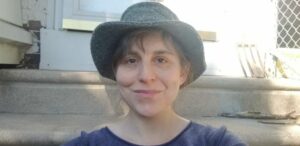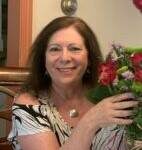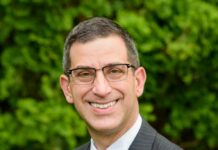
Rabbi Erica Steelman
Parshat Yitro
I recently had the good fortune to sit down with the esteemed and beloved Moshe and his esteemed and beloved father-in-law, Yitro.
Over cups of tea and coffee, a wide range of topics emerged: the Oct. 7 attacks, the unknown state of the hostages still in captivity, the war between the state of Israel and Hamas, the fractures among Jews in the United States and anti-Jewish fervor manifesting in all sorts of ways around the world. I noted how many people I speak to live with heartache, fear and despair.
As I sat with Moshe and Yitro, I felt grounded and encouraged. Their wisdom and guidance can help us get through this time of destruction, hate, misunderstanding and disinformation. Though they speak in familiar and foreign ways, I will do my best to convey what I received from them. Ultimately, however, misrepresentations of their brilliant teachings are my errors alone.
Unless otherwise indicated, what follows are my own words, the vessels accessible to me to express some divrei torah.
The importance of openness and movement: pursuing shalom with an open heart and mind, with empathy, sensitivity, curiosity and humility.
Go out beyond your comfort zone. Leave your titles, your teams, your posturing. Take your caring, open heart and mind. Lech lecha, go forth, on your own. The path reveals itself to you, but only after you start the journey. Begin and do so with care. Notice. Remove and leave behind tinted, colored glasses. Leave behind the devices that limit what you hear. Remove the armor, everything that prevents you from touching and being touched.
Step out of the cement, plastic, computers, cars, prejudice, bias, hate — they are not welcome among the trees, the river, the soil, air and rocks and all that teem in and around them. Children are taught to hate the other. Go, lech, with the openness and curiosity of a child — a precious gift we, adults, can continue to harness if we reject the domination and manipulation, the bullying of people who want to limit what we know and limit what and who we encounter, examine and embrace.
You can do this. We can do this. We must do this.
Go out into the wilderness, bamidbar, where hierarchies of worth make no sense to the power and majesty of the interconnected whole. Go to the wilderness that is accessible from within.
This wilderness, midbar, within is most holy. It requires effort, immense intentionality, focus, desire — but we can do this, you can do this, breathe in, exhale, breathe in, exhale.
One step at a time. One moment at a time. Move into that internal spaciousness that is part of the whole. Echad, One.
The wilderness speaks the language of we — interconnectedness in an intricate, complicated we. Humans did not create the worldwide web; we are a part of it.
Revelation and Covenant
Revelation heeds no human command. It does not come, sit, beg or roll over. While we are on the way, living our life, moving between point A to point B; from Y to 5, it occurs. Only when we are not actively seeking it per se and instead noticing and caring about, and for, others might we encounter it.
Be receptive, sensitive and aware. Pay attention. Observe. Receive information directly. Ask questions. Listen. Shema. Engage with people and things from different perspectives. Know that there is much more than we can ever see, hear, touch, know, experience and understand. To be human is to be limited. We need one another. Revelation and peace will emerge in dynamic interactions, in relationships. Revelation and covenant go hand in hand.
The key equation for everything is: I and Thou is We, which equals Love.
This is dedicated to my beloved parents, may they go from strength to strength, and to all who help along the way.
Rabbi Erica Steelman is an educator and spiritual care provider and the chaplain at Horsham Center for Jewish Life. The Board of Rabbis of Greater Philadelphia is proud to provide diverse perspectives on Torah commentary for the Jewish Exponent. The opinions expressed in this column are the author’s own and do not necessarily reflect the view of the Board of Rabbis.





